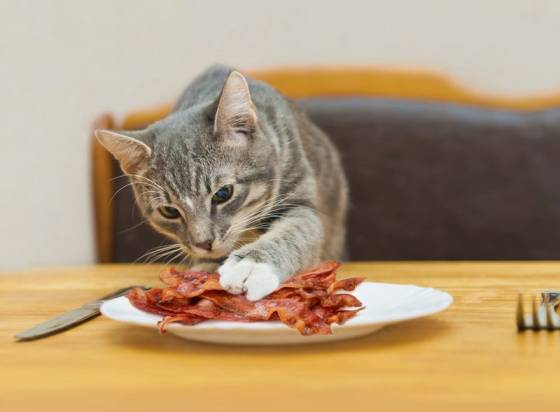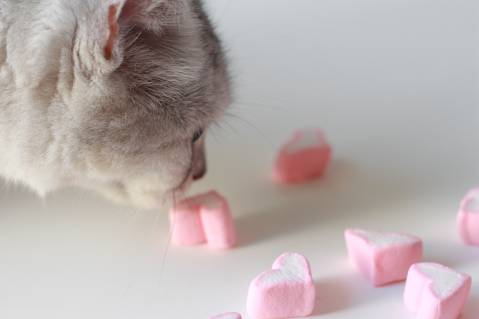Who doesn’t love bacon? The smell is enough to make you hungry just about any time! And the same goes for our cats. Our feline friends also enjoy the aroma of bacon cooking on the stove! But can cats have bacon?
Connect with a verified veterinarian in minutes. Licensed vets are available 24/7 to answer your questions. No need to worry about your furry family member.
Has your cat eaten some bacon? Are you worried the bacon will make her sick? If so, then you’ve come to the right place.
In this article, we’ll take a look at bacon and whether or not it’s safe for your cat. Let’s get started!

What is Bacon?
Bacon is a type of meat that comes from a pig’s back or belly. The meat is salted to cure (preserve) the meat. It can be enjoyed on its own or as an ingredient in dishes of all kinds! Bacon goes with just about anything!
While many pet parents enjoy bacon, it’s not something that should be eaten too often. The reason is that bacon contains high amounts of fat and salt. . Too much salt can cause problems with the cardiovascular system and can cause high blood pressure.
But is bacon safe for cats? Can bacon make cats sick?
Bacon & Cats
So, is bacon safe for cats? Whilst bacon is not toxic to cats, you shouldn’t feed your cat bacon.
If your cat has eaten a small piece of bacon, she should be OK. It is possible that a cat with a sensitive stomach could experience some digestive upset (nausea, vomiting, diarrhea).

Review symptoms, medications & behavior to keep your pets healthy with a Vet Online in just minutes.
Ask a Vet Live NowBacon Every Day for Cats is Not Recommended
OK, now we’re ready to take a look at why cats should not eat bacon every day. The main reason a cat shouldn’t have bacon too often is that the meat is high in fat and salt. Both of these can cause health problems in cats.
When cats have too much salt in their diet, they can develop health issues similar to pet parents. These include high blood pressure and salt poisoning.
Another problem with bacon is that it contains high amounts of fat. Cats are carnivores; however, they require lean meat. Too much fat in a cat’s diet can lead to digestive problems. Over time, if a cat eats too much fat, they can become obese which can result in serious health problems.
So, if your cat has eaten a small piece of bacon, or even an entire slice, she will probably be OK. However, try to keep her from accessing bacon on a regular basis, as it could make her sick and/or obese.
Connect with a verified veterinarian in minutes. Licensed vets are available 24/7 to answer your questions. No need to worry about your furry family member.

Gemma Cliffin BSC BVSC MRCVS
This article has been reviewed and approved by an independent Veterinarian: Dr Gemma Cliffin MRCVS is an experienced small animal vet who combines her love of writing alongside working in practice. Since her graduation from the University of Liverpool in 2014 she has worked in a wide variety of roles including first opinion practice, as a night vet and as a locum vet. She has also spent time working at a charity clinic in the Cook Islands which was a challenge but also immensely rewarding. She loves all aspects of veterinary work, but she especially enjoys medicine cases and diagnostic imaging. She is passionate about pain-management, particularly in her more senior patients. She currently works in a first opinion small animal practice in North Yorkshire where she deals with both routine and emergency cases.
Review symptoms, medications & behavior to keep your pets healthy with a Vet Online in just minutes.
Ask a Vet Live Now




